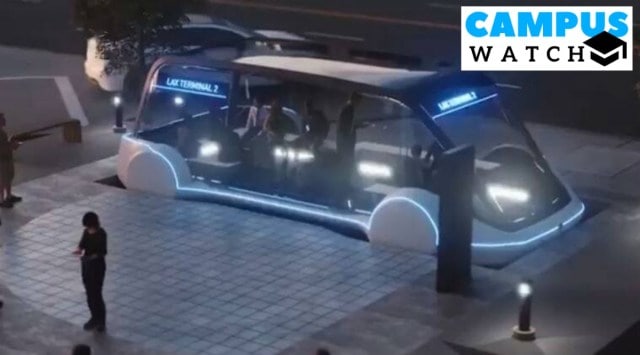Campus Watch: From college lab to track, a made-in-Pune pod based on hyperloop technology
Team Vegapod Hyperloop, which came together in 2018 at Pune’s MIT World Peace University, is all set to represent the country at the European Hyperloop Week to be held in the Netherlands this month.
 Team Vegapod Hyperloop, which came together in 2018, comprises students from across all engineering branches and some management branches of Pune’s MIT World Peace University.
Team Vegapod Hyperloop, which came together in 2018, comprises students from across all engineering branches and some management branches of Pune’s MIT World Peace University. An inter-continental journey within hours or an intercity trip under minutes. This captivating idea of hyperloop transport, proposed by tech entrepreneur Elon Musk in 2013, got a team of 40 students from Pune’s MIT World Peace University together. After four years of hard work, the team is set to represent India at the European Hyperloop Week that will be held at Delft University, Netherlands this month.
Team Vegapod Hyperloop, which came together in 2018, comprises students from across all engineering branches and some management branches of the university, besides alumni and faculty who together worked on the idea of a vehicle that runs on electricity supplied by solar panels and functions inside an enclosed, partially vacuum tube while levitating on the track to avoid friction and air resistance.
Battling several problems, including back-to-back Covid-19 lockdowns which meant that the students left campus and went to their hometowns for over a year, bringing the collaborative work to a halt, it was only in 2021 that the team tasted its first success by developing a functional prototype called Bose.
Captain Sakshi Sharma says her team comprises nearly 40 people from different years and different branches of engineering. “We have sub-divided ourselves into groups. There is also a team of management students who handle budgets, delivery of parts, vendors, outreach, sponsors and so on. We manufacture sub-scale prototypes of hyperloop pods by utilising commercially available technology. It took us three years to develop the first prototype because we needed to design and test every possible sub-system. A lot of integration is involved, which takes time. Also, Covid happened, so a lot of people were not there on campus. Hands-on work did not happen, we could not collaborate.”
Bose, the first prototype, was made at a cost of Rs 1.75 lakh and reached a speed of 75 kmph. It was tested at a self-designed track of 50 metres within the campus. In 2021, the team participated in the European Hyperloop Week in Valencia, Spain, and the pod was recognised as the fastest one in Asia. The team also represented India at the Canadian Hyperloop Conference in Waterloo, Canada in May this year.
For the next competition in the Netherlands, the prototype was developed in three months, but at a cost of Rs 5 lakh, owing to some design changes. This pod aims to reach a speed of 108 kmph, tested at a 200-metre track this time around.
“I know some may say what’s so exciting about reaching a speed of above 100 kmph, but one must understand these are smaller experiments to test the engineering and technology. We are testing one subsystem at a time and going through different stages. We are currently at stage 2, taking it closer to the hyperloop technology where eventually we hope to reach a speed of 1,200 kmph,” Sharma said. However, the main objective of Team Vegapod is not just achieving speed but using clean energy as well as cost-effective transport. For sustainable and power-efficient travel, the team plans to power the pod with solar panels. Though they tried experimenting with the idea, they had to go with an electric-powered vehicle.
Alumni Pranay Luniya and Kartik Kulkarni, who have formed Quintrans Hyperloop, a start-up birthed at MIT-WPU to accelerate the development of hyperloop technology, said the electric vehicle option was chosen to lower costs. “The solar panel-powered vehicle would take a lot of investment and high-end engineering which is not possible in a college set-up. We are currently talking to investors and it is the next stage,” said Luniya.







